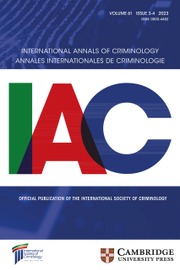No CrossRef data available.
Article contents
Procedural Guarantees of the Rights of Experts and Specialists in the Collection and Use of Documents as Sources of Evidence in Criminal Proceedings
Published online by Cambridge University Press: 17 September 2025
Abstract
The purpose of this study was to determine the procedural guarantees provided to experts and specialists in the process of collecting and further studying documents as evidence in criminal proceedings. The study revealed that a document in the field of evidence in criminal proceedings can be both material evidence and a direct source of evidence. Thus, the main difference between these concepts is that an expert has the right to conduct an independent investigation, while a specialist has a rather limited function – to apply special knowledge in the course of a criminal investigation. The paper analysed the laws and regulations of Ukraine and the European Union concerning the definition of the rights of an expert and specialist in criminal proceedings, including the collection and use of documents as sources of evidence. The study highlighted the important role that experts and specialists play in ensuring the integrity and reliability of evidence, emphasizing the need for reliable procedural protection of their rights. The practical significance of this study lies in its potential use by researchers for a deeper investigation of the problems of ensuring the procedural rights of experts and specialists in criminal proceedings.
Abstracto
El objetivo de este estudio fue determinar las garantías procesales que se ofrecen a los peritos y especialistas en el proceso de recopilación y análisis de documentos como prueba en procesos penales. El estudio reveló que un documento en el ámbito probatorio en procesos penales puede ser tanto prueba material como fuente directa de prueba. Por lo tanto, la principal diferencia entre estos conceptos radica en que un perito tiene derecho a realizar una investigación independiente, mientras que un especialista tiene una función bastante limitada: aplicar conocimientos especializados en el curso de una investigación penal. El trabajo analizó las leyes y normativas de Ucrania y la Unión Europea relativas a la definición de los derechos de un perito y especialista en procesos penales, incluyendo la recopilación y el uso de documentos como fuente de prueba. El estudio destacó el importante papel que desempeñan los peritos y especialistas para garantizar la integridad y fiabilidad de las pruebas, haciendo hincapié en la necesidad de una protección procesal fiable de sus derechos. La importancia práctica de este estudio reside en su posible utilización por parte de los investigadores para profundizar en la problemática de la garantía de los derechos procesales de los peritos y especialistas en procesos penales.
Abstrait
L’objectif de cette étude était de déterminer les garanties procédurales offertes aux experts et spécialistes lors de la collecte et de l’analyse approfondie de documents servant de preuves dans le cadre de procédures pénales. L’étude a révélé qu’un document servant de preuve dans le cadre de procédures pénales peut être à la fois une preuve matérielle et une source directe de preuve. Ainsi, la principale différence entre ces concepts réside dans le fait qu’un expert a le droit de mener une enquête indépendante, tandis qu’un spécialiste a une fonction plutôt limitée : appliquer ses connaissances spécialisées au cours d’une enquête pénale. L’article a analysé les lois et réglementations ukrainiennes et européennes relatives à la définition des droits d’un expert et d’un spécialiste dans le cadre de procédures pénales, notamment en ce qui concerne la collecte et l’utilisation de documents comme sources de preuves. L’étude a mis en évidence le rôle important des experts et spécialistes dans la garantie de l’intégrité et de la fiabilité des preuves, insistant sur la nécessité d’une protection procédurale fiable de leurs droits. L’intérêt pratique de cette étude réside dans son potentiel d’utilisation par les chercheurs pour une étude plus approfondie des problèmes liés à la garantie des droits procéduraux des experts et spécialistes dans le cadre de procédures pénales.
摘要
本研究旨在确定在刑事诉讼中收集和进一步研究证据文件过程中,专家和专业人员应享有的程序保障。研究表明,刑事诉讼中的证据文件既可以是物证,也可以是直接证据来源。因此,这两个概念的主要区别在于,专家有权进行独立调查,而专业人员的职能则较为有限,只能在刑事调查过程中运用专业知识。本文分析了乌克兰和欧盟关于刑事诉讼中专家和专业人员权利定义的法律法规,包括收集和使用作为证据来源的文件。研究强调了专家和专业人员在确保证据完整性和可靠性方面发挥的重要作用,并强调了对其权利进行可靠的程序保护的必要性。本研究的实际意义在于,它可以帮助研究人员更深入地研究如何保障刑事诉讼中专家和专业人员的程序权利。
ملخص
هدفت هذه الدراسة إلى تحديد الضمانات الإجرائية المُقدمة للخبراء والمتخصصين في عملية جمع الوثائق ودراستها كأدلة في الإجراءات الجنائية. وكشفت الدراسة أن الوثيقة في مجال الأدلة الجنائية يمكن أن تكون دليلاً مادياً ومصدراً مباشراً للأدلة. وبالتالي، يتمثل الاختلاف الرئيسي بين هذين المفهومين في أن للخبير الحق في إجراء تحقيق مستقل، بينما تقتصر وظيفة المتخصص على تطبيق معارفه الخاصة في سياق التحقيق الجنائي. وقد حللت الدراسة قوانين ولوائح أوكرانيا والاتحاد الأوروبي المتعلقة بتعريف حقوق الخبير والمتخصص في الإجراءات الجنائية، بما في ذلك جمع الوثائق واستخدامها كمصادر للأدلة. وسلطت الدراسة الضوء على الدور الهام الذي يلعبه الخبراء والمتخصصون في ضمان سلامة الأدلة وموثوقيتها، مؤكدةً على ضرورة توفير حماية إجرائية موثوقة لحقوقهم. وتكمن الأهمية العملية لهذه الدراسة في إمكانية استخدامها من قبل الباحثين لإجراء تحقيق أعمق في مشاكل ضمان الحقوق الإجرائية للخبراء والمتخصصين في الإجراءات الجنائية.
Keywords
Information
- Type
- Article
- Information
- Copyright
- © International Society of Criminology, 2025

